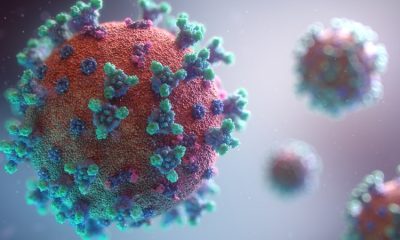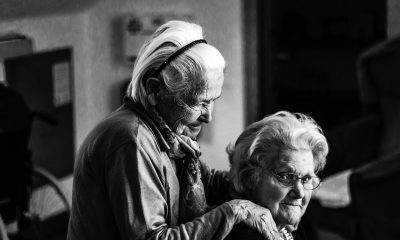Seniors and Depression
The Centers for Disease Control and Prevention (CDC) estimate that around 7 million people aged 65 and over suffer from depression in the USA alone. Depression is therefore quite common among older adults, however, it is not a normal part of aging.
Depression is a treatable medical condition, and it shouldn’t be seen as an inevitable side effect of aging, declining physical health, or other life circumstances. Its symptoms have a negative impact on many aspects of life, including the person’s mental and physical well-being, as well as how well they can cope with daily activities.
As depression is a physiological condition characterized by a chemical imbalance in the brain, depressed people can’t just ‘get over it’ and normally require treatment. Fortunately, with the help of therapy, medication, support and/or helpful actions, the person suffering can reduce the symptoms and eventually overcome depression.
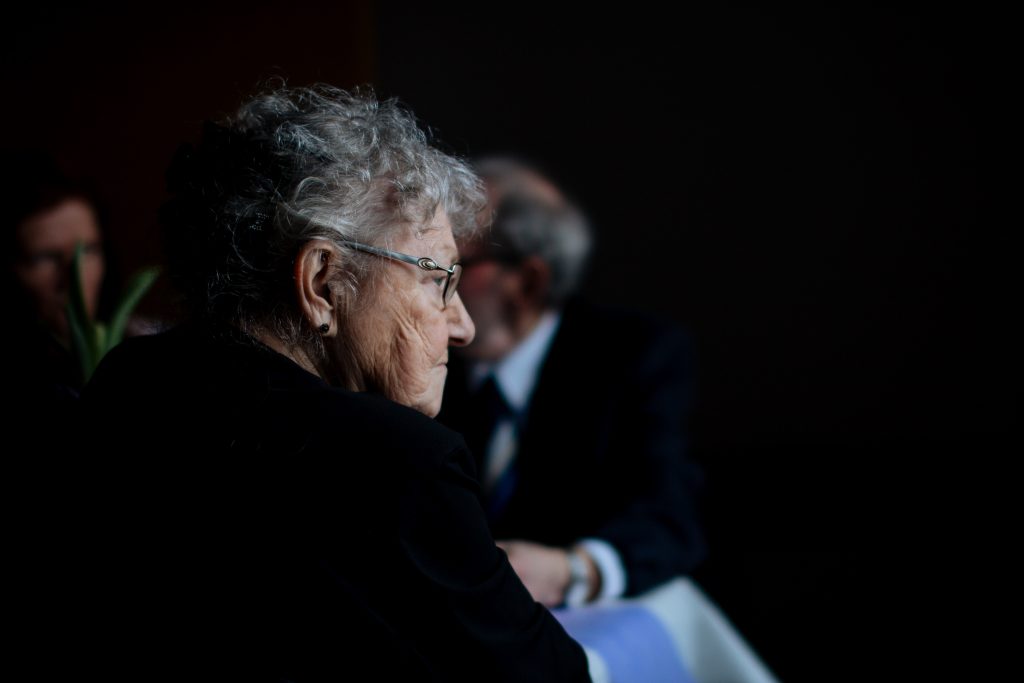
Causes and Consequences of Senior Depression
Why it can happen
The precise cause of depression isn’t yet known, however, various factors contribute to its development. As we age, we often face more problems that affect our emotional well-being and require adjusting to. These can be retirement, relocation, physical health problems, or loss of a spouse, family members or friends.
It’s normal for these circumstances to cause sadness, stress, or anxiety, but after a period of adjustment, most people regain their mental balance. For others, these events can trigger depressive disorders.
However, depression isn’t only caused by traumatic events. Other factors can include:
Genetics: The risk of developing depression is higher if other family members have also struggled with it. Women also have a higher risk than men.
Personal history: Having suffered from depression in the past also increases the chances of developing it later in life.
Medical conditions: serious illness such as Alzheimer’s disease, diabetes, cancer etc., as well as chronic pain can cause depression or worsen its symptoms.
Medications and alcohol: Various medications, as well as alcohol abuse, can be a cause of depression.
No apparent reason: As a chemical imbalance in the brain, depression can also appear without any apparent reason.
Symptoms of depression in the elderly population
There are different types of depression, the most common among elders being major depressive disorder and persistent/chronic depression.
Major depressive disorder is characterized by episodes lasting at least 2 weeks, where the person affected experiences severe depression symptoms such as persistent sadness, or lack of interest and motivation that affects many aspects of their life.
With persistent depression, the symptoms must last for at least 2 years for a valid diagnosis. The person suffering will experience similar symptoms but usually at a lower intensity. However, someone with persistent depression can also occasionally suffer from episodes of major depressive disorder.
Common depression symptoms in the elderly can include:
- feelings of sadness, worthlessness, or hopelessness
- insomnia
- lack of energy and motivation
- irritability and grumpiness
- attention and concentration difficulties
- confusion and memory issues
- lack of interest in activities and social interaction
- social isolation
- unexplained physical issues and pain
- changes in appetite and weight
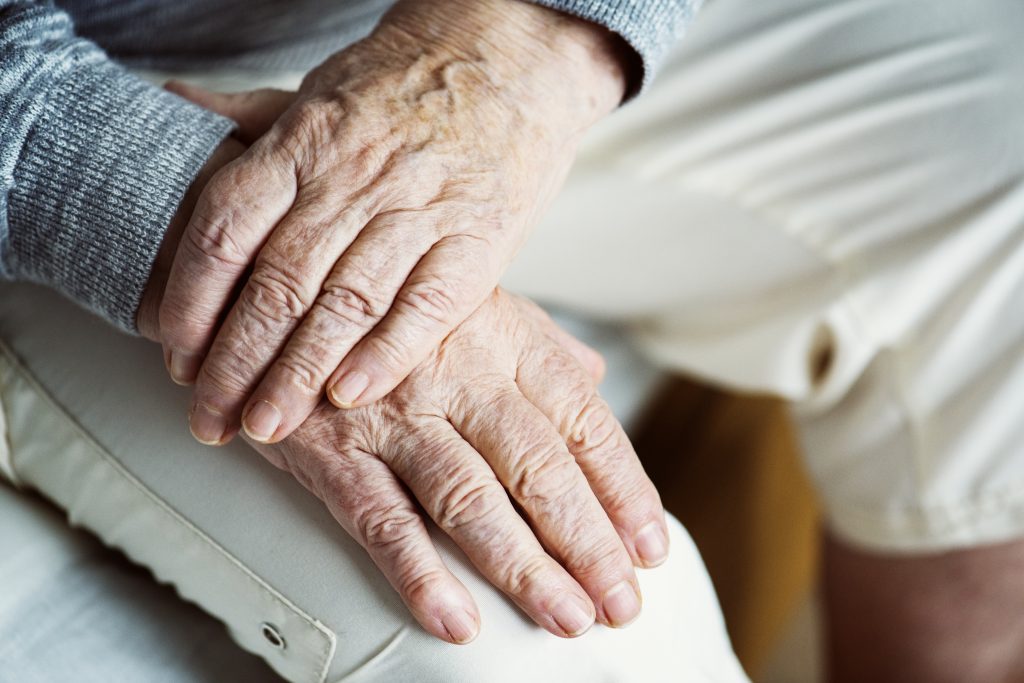
Why senior depression is often overlooked
Depression in seniors can often look different from depression in the younger generation. Many times, sadness isn’t the main symptom they exhibit. Instead, seniors can have less obvious symptoms, as mentioned above, that can be often misinterpreted as aspects of other physical conditions.
Thus, both doctors and family members sometimes have trouble recognizing depression in elders.
For example, confusion, memory issues and difficulty concentrating can often be wrongly interpreted as signs of dementia. And while these symptoms can look similar at first, there are notable differences. In the case of dementia, the mental condition worsens slowly, while depression can cause a rapid change. In addition, a person with depression will normally worry about their memory loss and moments of confusion, while someone with dementia might not worry about, or even notice these issues.
If persistent sadness isn’t present, other signs such as trouble sleeping, appetite changes, or unexplained physical pain can be mistaken for symptoms of various physical illnesses or medication side effects.
In addition, elders often don’t open up about having depression, either for fear of becoming a burden, for fear of judgment due to stigma, or for lack of hope that things can improve (hopelessness being a common symptom of depression).
Grief vs. depression
Family members can miss the signs of depression when it overlaps with grief.
Grief is a normal part of life which can become more common in elders, with the death of a spouse or friends. Grief and depression can look very similar, causing intense sadness, insomnia, or appetite loss.
The grieving process has no set timeline and everybody copes differently, yet it normally eases with time. Sometimes, grief can turn into ‘complicated grief’, which persists for longer and can often involve a fixation or avoidance of the event causing the grief, or a difficulty accepting it.
Grief can sometimes also trigger major depression. However, while the grieving is a natural and inevitable process, depression is a disorder that requires treatment and can often go undiagnosed during a grieving period.
If you or your loved one are in grieving, look out for the following signs which can indicate depression:
- rejecting help or support
- self-isolation
- feelings of worthlessness
- guilt that is unrelated to what caused the grief
- continuous difficulty to carry out regular and daily activities
Social isolation and loneliness
Depression can also be more difficult to recognize when a senior is socially isolated.
Social isolation and loneliness are unfortunately common among the elderly and have been linked to a variety of negative mental and physical health issues.
While social isolation is the physical aspect of being separated from people (i.e. living alone, not participating in social activities etc.), loneliness is the psychological distress of feeling alone and disconnected. In short, people can feel lonely even while being among others, and living alone doesn’t necessarily result in feeling lonely.
Social isolation is a very common trigger of depression in seniors, and it’s important to note that even perceived isolation and loneliness can cause depressive symptoms.
In the case of socially isolated elderly people, the symptoms of depression can be more dangerous. Depression can lead to a lack of self-care, appetite, and energy levels that can cause many health issues in the case of unmonitored, isolated seniors.
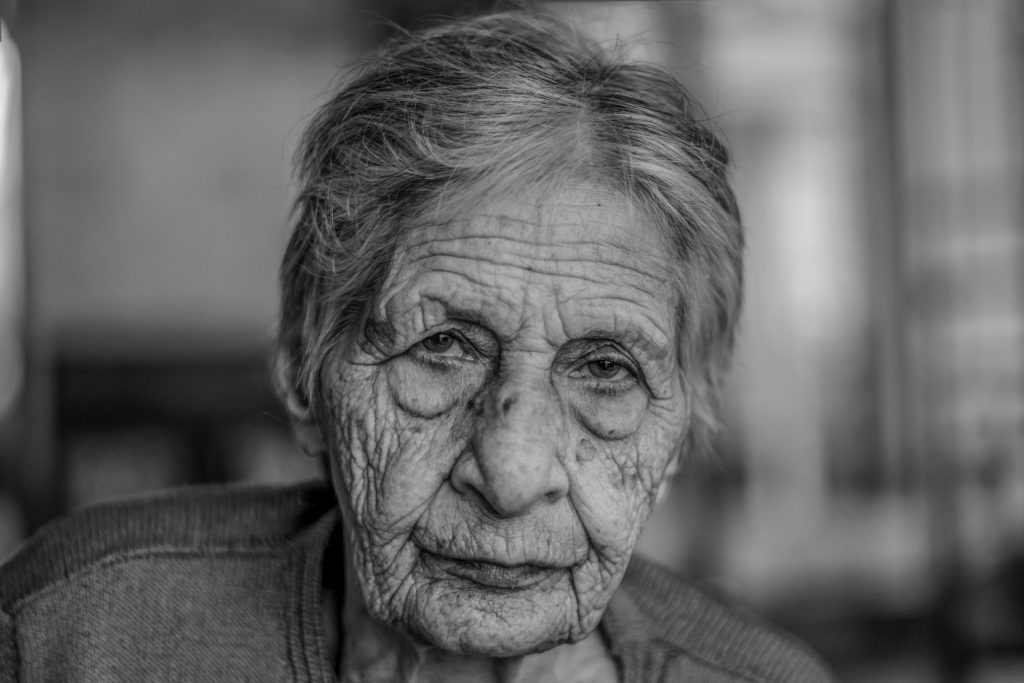
Consequences of untreated depression in the elderly
If left untreated, depression can pose real threats to the health of the senior affected.
Research has shown that depression in older people can cause disabilities and medical complications, as well as increase the risk of heart disease and the risk of death from existing illnesses.
Other consequences can include substance abuse, social isolation, symptoms of anxiety, and a withdrawal from social activities. Depression is also a common cause of suicide in elders.
Suicide
Since 1999, suicide rates have increased in the in all US states apart from Nevada (decreased by 1%), according to the Centers for Disease Control and Prevention (CDC). Some states have seen an increase of up to 58%.
Despite the common misconception that young people have a higher risk of suicide, the truth is that suicide rates are highest in the senior population. In fact, while the elderly are 12% of the US population, they make up 18% of suicide deaths. Additionally, it’s estimated that senior suicides are under-reported, many being ‘silent suicides’: suicide by starvation, dehydration etc., which are harder to classify as such.
The risk increases if you are divorced or male. Also, the older the person, the higher the risk.
While not all suicides are related to depression, they are very often linked, and the risk increases when depression is also accompanied by substance abuse, grief, financial distress, debilitating pain, and other stress factors.
Joiner’s Interpersonal Theory of Suicide
One of the most renowned theories of suicide, Thomas Joiner’s Interpersonal Theory of Suicide (2005), identifies three components that, when combined, can often result in suicide:
- Thwarted Belongingness (low belonging): feeling accepted by others and having meaningful connections is crucial for our psychological well-being.
In the elderly population, Thwarted Belongingness is linked with the social isolation and loneliness that seniors so often suffer from.
- Perceived Burdensomeness: is the feeling of having become a burden to society, your family, or your friends.
Later in life, people can experience Perceived Burdensomeness due to declining physical condition and dependency on others, lack of work etc.
These first two factors can lead to the desire to commit suicide and help explain why suicide rates in senior are more common. However, the third factor is necessary in order to carry out the act:
- Acquired Capability for Suicide: according to Joiner, the natural self-preservation instinct or the fear of death can only be overcome through life experiences such as exposure to pain, trauma or self-harming behavior. These lead to desensitization and make suicide easier to carry out.
Preventing elderly suicide:
Recognizing the signs of suicide is key to preventing it. The first step is to recognize and diagnose depression (see depression symptoms above). Statistics show that 70% of seniors who commit suicide visit their physician during the month before ending their life, yet most never get diagnosed.
Look out for the following signs in the behavior of your loved one, which could indicate a major depressive episode and high risk of suicide:
- expressing suicidal thoughts or intent
- seeking firearms, other lethal weapons, or storing pills
- threatening to harm themselves
- social isolation and lack of self-care
- decreased interest in personal safety or health
- putting affairs in order and giving valuable possessions away
If you are concerned about your loved one exhibiting suicidal behavior or signs of major depression, you can help by:
- eliminating access to firearms or other means of suicide.
- talking about their feelings and about suicide: people often shy away from discussing suicide out of fear of giving the person ideas, but that’s not the case. Ask the person if they are thinking of suicide. They may be relieved to be able to talk about it.
- offering support: simply having a supportive family and circle of friends can make a huge difference in a person’s mindset, by reducing the ‘Thwarted Belongingness’ and ‘Perceived Burdensomeness’ factors identified by Joiner.
- suggesting medication and therapy: therapy and medication are very effective in preventing suicide and helping with major depression.
If you think someone is in immediate danger of committing suicide, dial 911 or call the National Suicide Prevention Lifeline at 1-800-273-8255, for free and confidential help. Don’t leave them alone until the emergency services tell you it’s OK.
Depression Prevention and Support
Lowering the risk of depression
If you are a senior worried about developing depression in the future, you can take steps to lower your risk. While some depression triggers such as genetics can’t be eliminated, the following steps will reduce the risk of depression triggered by other factors:
- Stay active: have an active lifestyle that includes exercise, a variety of hobbies, and a satisfying social life.
- Monitor the effects of medication: if you think any medication might be causing symptoms of depression, consult your doctor.
- Ask for help: When going through difficult periods due to illness, grief etc., don’t hesitate to ask for support from your friends and family. They will be happy to help you.
- Restrict alcohol: as alcohol consumption has been linked to depression, avoid it especially if you notice any negative effects on your emotional well-being.
- Sleep well: if you have trouble sleeping, try various methods for regulating your sleep schedule, such as calming teas, blackout curtains, not looking at screens after 9pm, white background noise, earplugs, and eye mask etc.
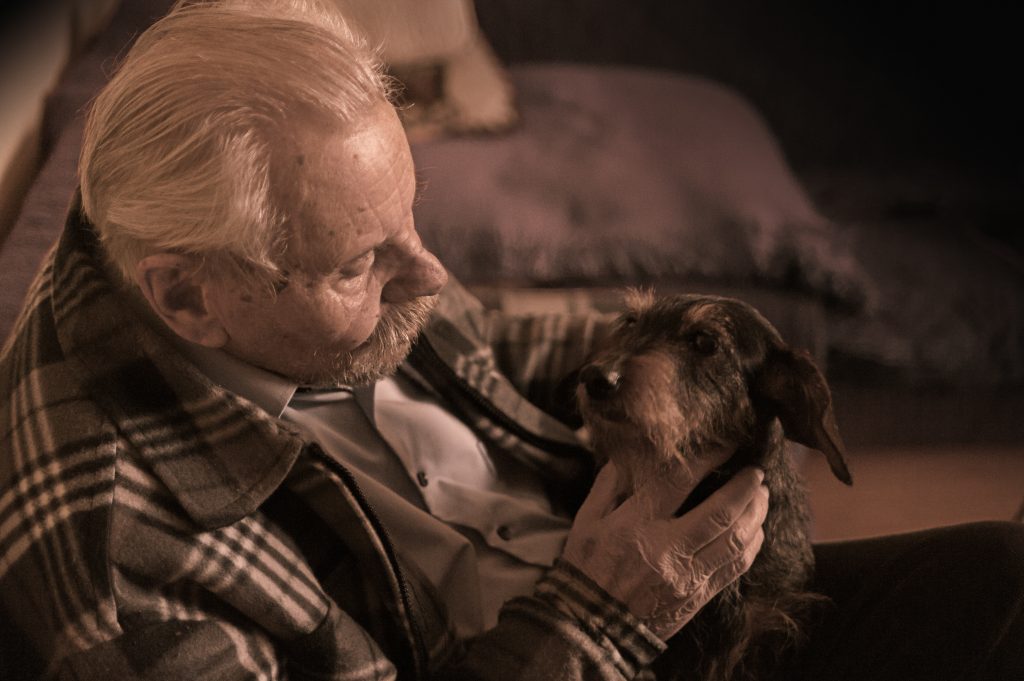
Treatment
Depression is treatable, with treatment options differing for each individual. The first step is to make an appointment with a doctor (who can help guide and refer you or your loved one to a specialist), or directly with a mental health professional such as a psychologist or psychiatrist. A professional will be able to help figure out which treatment choices work for you, often trying multiple options.
The following options are potential treatment options for seniors:
Therapy: seeing a therapist can help cultivate coping skills and address difficult life situations, such as health issues or grief, that might be causing or aggravating depression. Cognitive behavioral therapy can help identify and break unhealthy thinking patterns, while interpersonal therapy is useful for addressing problematic relationships that could worsen depression.
Support groups: elderly people can benefit from interacting with other people going through similar challenges. Support groups can offer hope and a safe, judgment-free space to talk.
Medication: in some cases, antidepressants can be a lifesaver. However, antidepressants can interfere with other medication that seniors are taking, and cause harmful or dangerous side effects such as confusion, falls, and bone density loss. Elder people are also more sensitive to medicine, therefore, antidepressant medication should be carefully supervised by a doctor.
ECT (electroconvulsive therapy): ECT is a procedure done under anesthesia in which small electric currents are transmitted to the brain, causing changes in the brain chemistry that can quickly reverse symptoms of depression. ECT is considered safe for older people and it is especially suitable for people with severe depression who can’t take antidepressants due to side effects or interactions with their other medications, or for people who are resistant to antidepressants.
How to ease depression symptoms
Aside from medical treatment, there are also various ways you can alleviate the symptoms of depression:
Pet or plant care: caring for a pet or plants can bring a renewed sense of purpose to your life. In addition, a pet also offers unconditional love and can reduce feelings of loneliness.

Volunteering: another way to cultivate a sense of purpose is by volunteering. Helping someone else won’t just make you feel good about yourself, it will also provide the opportunity to socialize with other people and maybe even make some new friends.
Enjoying activities: after retirement, you can find yourself lost if you don’t have hobbies to engage in. Finding enjoying activities such as playing cards, board games, arts and crafts, reading, etc. can help ease depression symptoms.
Learning something new: learning keeps the mind engaged and active, and can give a sense of accomplishment that is often needed when suffering from depression. Learning something new could be an activity such as knitting or gardening, that could also become a hobby, or it could be going to a class, or even taking a college course. There are plenty of universities across the US that offer free or cheap classes for seniors.
Physical activity: exercising is crucial for both your physical and mental health, and has been proven to help reduce symptoms of depression. As we age, staying active is especially important for reducing the risk of falls and maintaining our physical independence. There are many exercises suitable for seniors to choose from.
Reducing loneliness: if your physical condition allows it, try to get out of the house often and get involved in your community. If you prefer staying in, consider regularly inviting your friends or family over for tea, card games, or other activities.
Avoiding alcohol: it might be tempting to use alcohol to feel better, but research shows that alcohol actually worsens symptoms of depression in the long run. It can also interfere with medication, so try to avoid it.
When you’re depressed, it might be hard to find the motivation and energy to put these steps into practice. Simply take small steps each day, letting go of the guilt you might feel when you’re not able to. Remember, you can’t get out of depression with sheer willpower, but any such small actions can lift your mood and ease your symptoms.
Helping a loved one
If you’re worried about a loved one suffering from depression, there are ways you can help them get through it and ease their symptoms.
Talking to a senior with depression
Many elder people are reluctant to bring up their depression and ask for help due to embarrassment or fear of burdening their loved ones.
Once you’ve noticed symptoms, try to start a conversation by mentioning your concern in a compassionate way. Ask them questions such as how they are feeling or when they have started feeling this way.
They might still not admit they suffer from depression, but they might be willing to talk about symptoms such as insomnia, lack of appetite or energy etc. In this case, don’t push the ‘depression’ diagnostic on them. Instead, help them by offering understanding and help with their symptoms, and encourage them to visit a doctor.
If they do open up, simply offering support is one of the most effective and beneficial things you can do. Many people don’t know what to say to a depressed person, but all that’s needed is understanding, compassion, and affection.
Here are a few things you can say to help:
‘I’m here for you’ – Especially when depression is also related to social isolation, knowing that you care and won’t leave them can be very helpful for a depressed person.
‘You matter to me’ / ‘I love you’ – Many people suffering from depression believe that their life doesn’t matter. Help them realize their worth.
‘How can I help you?’ Many times, people with depression might be reluctant to reach out for help. Emphasize that you really do want to help, and listen to their needs. They might need help with daily chores, appointments, or they might just need some company. Even if they don’t ask for anything, your offer will make them feel better.
‘There’s nothing wrong with asking for assistance’ – Older adults tend to be more affected by the stigma of depression. Encourage them to talk to a doctor, eliminating the shame.
‘I understand what you’re going through’ – Only say this if you have suffered from major or chronic depression. Sharing your story can help reduce stigma, fear of judgment, make the other person feel understood, and show them the potential for recovery.
‘There is hope’– People with depression can lose hope, so reassure your loved one that depression is a treatable illness from which they can recover.
Avoid saying the following:
- it’s all in your head
- other people have it worse
- just be more positive
- stop feeling sorry for yourself
- snap out of it
Any statements that implicitly put the blame on the other person’s lack of willpower, motivation, or strength, only intensify their feelings of guilt, hopelessness, and shame. These statements won’t help the person get better.
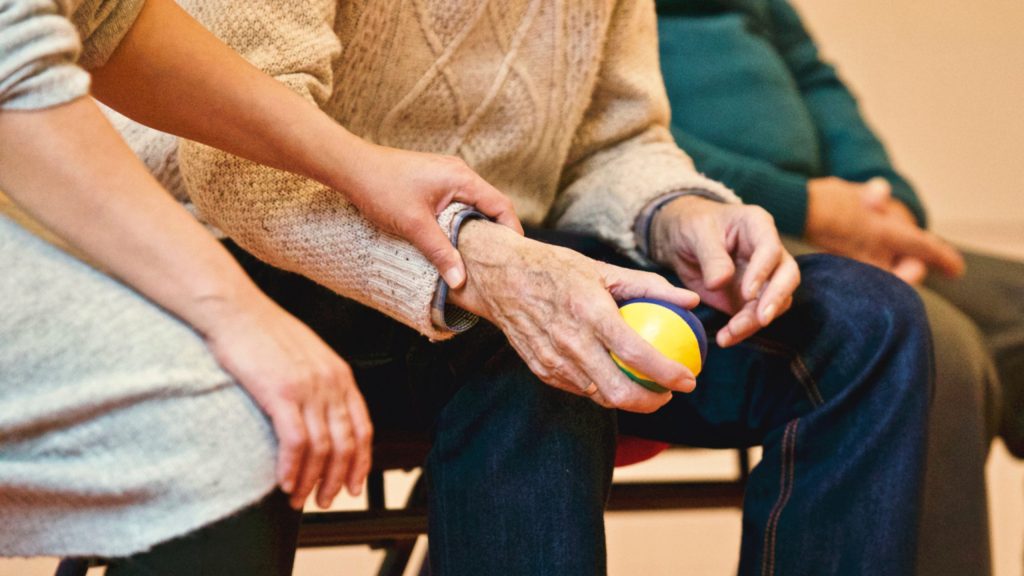
How you can help
While you can’t cure someone else’s depression, there are various things you can do to help them get through it.
Ease loneliness: you can ease their loneliness not only by verbally expressing your affection and support, but by also keeping them company, or helping them with daily responsibilities. Call and visit them as often as you can, and find pleasant activities to enjoy together. Help create a circle of friends and family members with whom the depressed person can interact on a regular basis.
Make sure they eat healthy: a loss of appetite is a common symptom of depression, and not getting proper nourishment can be terrible for their health. If your loved one doesn’t have the energy or motivation to prepare healthy meals, help prepare nutritious foods and snacks to have handy, and make sure they are eating well.
Help with appointments: people with major depression often have difficulty to fight for themselves and even carry out daily activities. Therefore, help guide them, help them make medical appointments and make sure they attend them.
Don’t take over their daily chores: trying to help your parent with chores can sometimes help make them feel supported, but other times it can increase the feeling of worthlessness. Observe how they react to your practical help and listen to their needs.
Don’t forget your own emotional well-being: caring for someone with depression can affect your own emotional health. Make sure you don’t neglect self-care, taking the time to recharge, and keeping on track of your own life. You won’t be able to help your parent if you exhaust your own strength and energy.
Final note: whether you or your loved one is suffering from depression, remember that with treatment it gradually gets better. It might take some time to figure out what treatment options work best, but eventually, the symptoms will ease and you can overcome depression.




